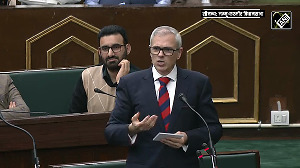The Reserve Bank of India expressed concern over state governments' large and growing deficits on Sunday and called for steps such as improving the tax-collection system and charging for public services to augment revenues.
In a study on state finances released on Sunday, RBI also said the states' growing debt burden was eating into revenues and leaving less for development spending.
"Strategy focusing on rationalisation of tax rates, better tax compliance, improved efficiency in tax administration and review of tax exemptions would be necessary for augmenting the states' revenue receipts," the central bank said.
The states' gross fiscal deficit as a percentage of GDP is budgeted at four per cent in the current financial year to March.
The combined deficit of the centre and the states is estimated at close to 10 per cent, which has kept the country's sovereign ratings at junk status.
Global rating agencies such as Fitch Ratings have said that this mammoth combined deficit has to be reduced.
They said the resultant large debt burden was gobbling up revenues and cutting into spending which could support economic development, thus limiting the economy's growth.
States' debt burden has been growing in recent years as their deficits widened on the back of inadequate tax receipts, negative or low returns from state-run firms, large subsidy payments, and higher salary and pension expenses.
As a percentage of GDP, this debt stock is estimated at 26.7 per cent, or Rs 6.8 trillion ($142.5 billion) by end-March. And interest payments will consume nearly a quarter of revenues.
The RBI said recent moves to restructure high-cost loans would help bring down the interest costs.
States will borrow Rs 10,000 crore (Rs 100 billion) by the end of March to prepay loans costing 13 to 14 per cent. The average borrowing cost for states governments in first 10 months of the current year was 7.49 per cent.
More high-cost loans will be prepaid over the next two years.
In order to shore up revenues, the RBI has suggested states explore options to increase tax revenues.
It said states should realise returns on their assets, and charge appropriately for the use of public services.
State governments have invested substantially in state-run companies, but dividends and profits remained negligible.
The RBI also called for pension reform as pension payments were emerging as a key expense, rising by an annual average of over 27 per cent between 1995-96 and 2000-01.






 © 2025
© 2025